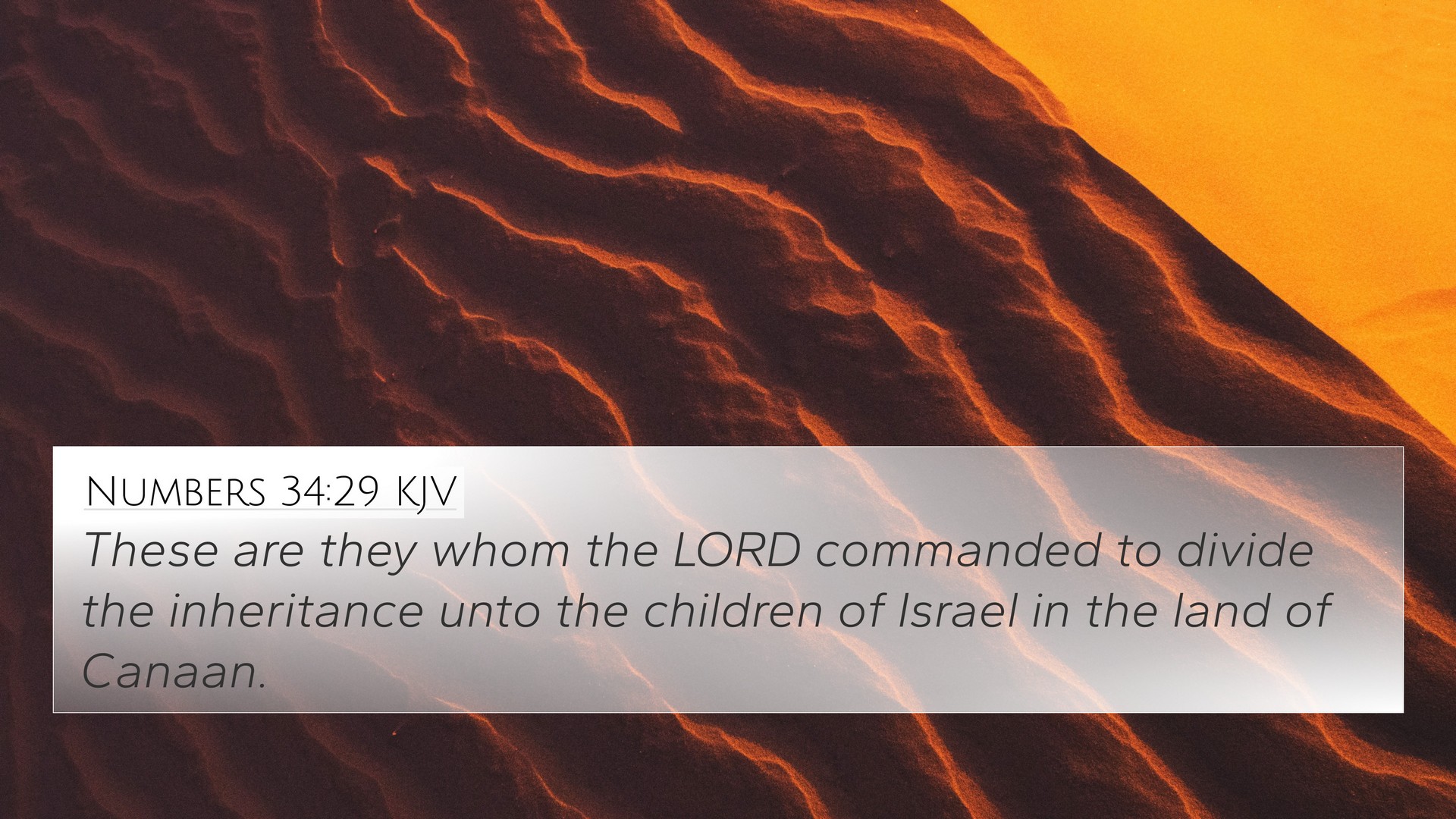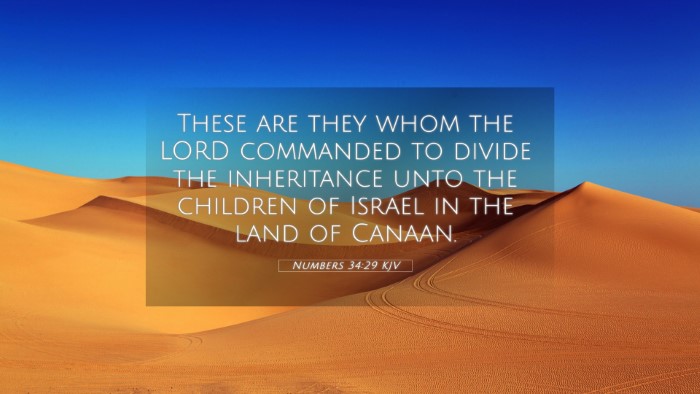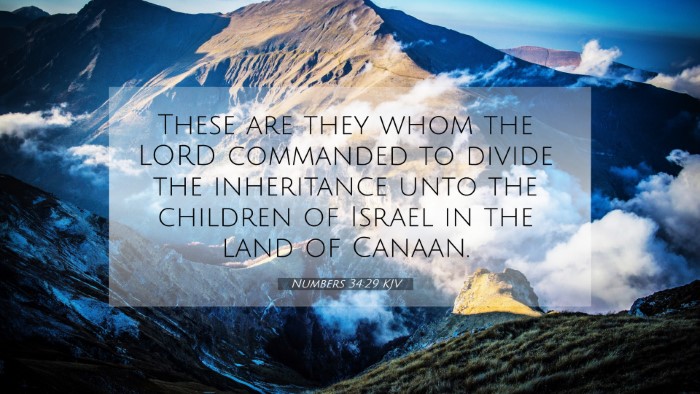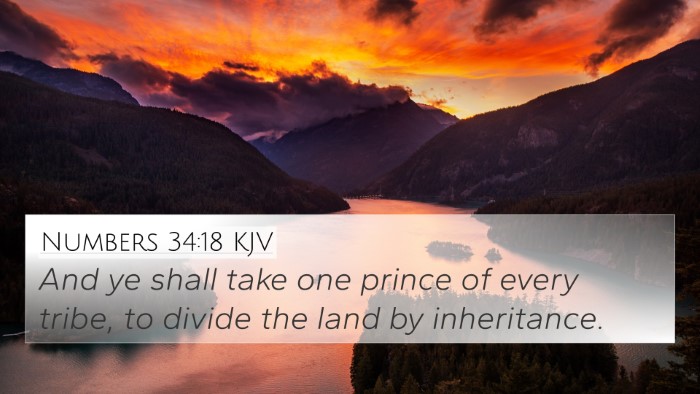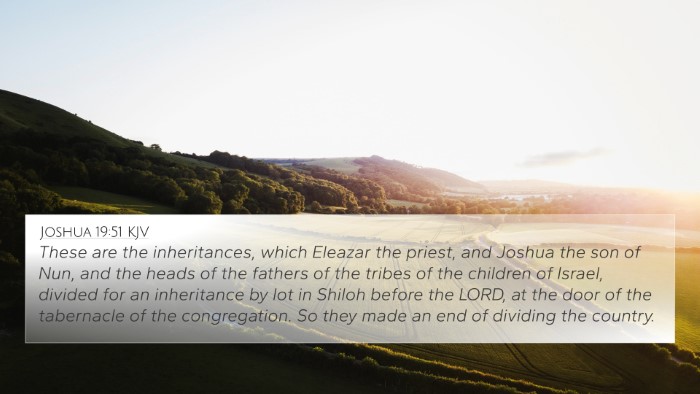Understanding Numbers 34:29
Numbers 34:29 reads: "These are the names of the men which shall divide the land unto you: Eleazar the priest, and Joshua the son of Nun."
Summary and Analysis
This verse is part of the concluding remarks in the book of Numbers, where God outlines the orderly division of the Promised Land among the tribes of Israel. It emphasizes the roles of specific leaders appointed for this task. Matthew Henry, Albert Barnes, and Adam Clarke provide a rich tapestry of context that reflects on the implications of this assignment.
Theological Insights
- Leadership and Authority: Eleazar the priest and Joshua represent divinely appointed leaders, signifying the importance of spiritual and military leadership during this critical transition.
- Divine Guidance: The mention of God choosing these individuals reflects the broader theme of divine providence in guiding Israel's journey and settlement.
- Holiness in Division: The role of the priest in the division stresses that even practical matters such as land distribution are to be conducted with holiness and reverence toward God.
Commentary Insights
Matthew Henry
Henry highlights the symbolic nature of leadership here, noting that responsibility is shared between the spiritual and the civil, emphasizing the need for remarkable fidelity in both roles.
Albert Barnes
Barnes points out that Eleazar's involvement indicates the continual necessity of God’s law and order even in the practical affairs of life, making a strong case for the importance of divine principles guiding human actions.
Adam Clarke
Clarke discusses the significance of names in ancient cultures and how they carry weight and expectation—a reminder that the leaders are accountable for their stewardship over the land.
Cross References
Numbers 34:29 is interconnected with several other Bible verses that enrich our understanding:
- Deuteronomy 1:38: "But Joshua the son of Nun, which standeth before thee, he shall go in thither: encourage him." - This showcases the continuity of leadership from Moses to Joshua.
- Joshua 1:1-2: "Now after the death of Moses the servant of the Lord..." - Marks the transition to a new era of conquest led by Joshua.
- Numbers 27:18: "And the Lord said unto Moses, Take thee Joshua the son of Nun, a man in whom is the Spirit, and lay thine hand upon him." - The divine selection of Joshua for leadership.
- Hebrews 13:17: "Obey them that have the rule over you, and submit yourselves..." - Highlights the concept of divinely appointed leaders.
- Psalm 78:70-72: "He chose David also his servant, and took him from the sheepfolds..." - Another example of God's providence in choosing leaders.
- Acts 1:24-26: "And they prayed, and said, Thou, Lord, which knowest the hearts of all men..." - Seeking God's guidance in leadership decisions.
- 1 Timothy 5:17: "Let the elders that rule well be counted worthy of double honour..." - Affirms the need for righteous and honorable leadership.
Applications and Reflections
The leadership model presented in Numbers 34:29 serves as a template for contemporary spiritual and community leaders. Here are some applications to consider:
- The Role of Divine Guidance: It is essential for leaders today to seek God’s guidance continuously, ensuring their decisions align with His will.
- Accountability: Like Eleazar and Joshua, modern leaders must recognize their accountability to God and those they serve.
- Collaboration: The partnership of spiritual and civil authorities is vital in faith communities today, echoing the cooperative spirit found in this verse.
Conclusion
The connection between Numbers 34:29 and the broader biblical narrative reveals the importance of faithful leadership in fulfilling God’s promises. As we study this verse, we are reminded of the significance of cross-referencing and linking Bible scriptures for a deeper understanding of God's message throughout the Scriptures.
Further Exploration
To explore more about themes in Numbers 34:29, consider using tools for Bible cross-referencing such as a Bible concordance or a Bible cross-reference guide. Engaging in cross-reference Bible study methods can help unveil the rich interconnections among various Biblical texts.
